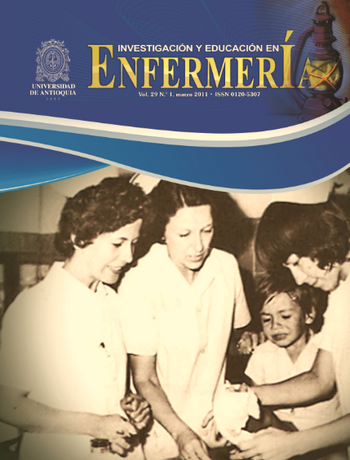Work situation of women in the gravidic-puerperal cycle
DOI:
https://doi.org/10.17533/udea.iee.8518Keywords:
Women’s health; legislation, labor; pregnancy.Abstract
Objective. To characterized the work situation of women in the gravid-puerperal cycle.
Methodology. Transversal study, performed in 2005 in a maternal unit in Riberirao Preto- Brazil that attends exclusively patients from the Unique Health System. 122 postpartum women who were in the labor market during pregnancy participated.
Results. 52.5% of the participants had remunerated activities, of which 45.3% were informal activities. Pregnancy was the reason for firing 79.3% of the women. When they finish their maternity license, women will have to assume their domestic and family duties beside the ones from the remunerated work ones.
Conclusion. Work situation of the studied population is not always favorable to the exercise of civil rights what ends in unemployment and work desertion.
Downloads
References
(1) Scorzanave LG, Menezes-Filho NA. Participação feminina no mercado de trabalho brasileiro: evolução e determinantes. Pesq Plan Econ. 2001;31(3):441-7.
(2) Ramos L, Soares S, Ávila M. Avaliação geral dos resultados da PNAD de 2004. Mercado de Trabalho. 2005;29:21-8.
(3) Bruschini C, Lombardi MR. Trabalhadoras brasileiras dos anos 90: mais numerosas, mais velhas e mais instruídas [Internet]. Brasil; 2002 [acesso 10 Abril 2004]. Disponível em: http//www.fee. tche.br/sitefee/download/mulher/2002/artifo5.pdf
(4) Tanaka ACD. Saúde da mulher Brasileira. In: Cianciarullo TI, Gualda DMR, Melleiro MM, organizadoras. Indicadores de qualidade: uma abordagem perinatal. São Paulo (SP): Cone Editora; 1998.
(5) Fonseca RM. Mulher. Direito e Saúde: repensando o nexo coesivo. Saúde soc. 1999; 8(2):3-32.
(6) Gomes KRO, Tanaka ACd’A. Morbidade referida e uso dos serviços de saúde por mulheres trabalhadoras, município de São Paulo. Rev Saúde Pública. 2003;37(1):75-82.
(7) Ramos CV, Almeida JAG. Alegações maternas para o desmame: estudo qualitativo. J Pediatr (Rio J). 2003;79(5):385-90.
(8) Worugji INE, Etuk SJ. The national breastfeeding policy in Nigéria: the working mothers, and the law. Health Care Women Int. 2005;26(7):534- 54.
(9) CFEMEA. Direitos do trabalho [Internet]. Brasil: CFEMEA; 2004 [acesso 20 Octubre 2005]. Disponível em http://www.cfemea.org.br/
(10) Osis MJD. Aleitamento materno exclusivo entre trabalhadoras com creche no local de trabalho. Rev Saúde Pública. 2004;38(2):172-9.
(11) Meleis AI. Safe womanhood is not safe motherhood: policy implications. Health Care for Woman Int. 2005;26:464-4471.
(12) Killien MG. The role of social support in facilitating postpartum women’s return to employment. JOGNN. 2005;34:639-46.
(13) Nichols MR, Roux GM. Maternal perspectives on postpartum return to the workplace. JOGNN. 2004;33:463-71.
(14) Spindola T, Santos RS. Mulher e trabalho: a história de vida de mães trabalhadoras de enfermagem. Rev Latino-Am Enfermagem. 2003;11(5):593-600.
Downloads
Published
How to Cite
Issue
Section
License
Derechos de propiedad / Direitos de Propriedade
English: If the article is accepted for publication, all copyright will be of exclusive property of Investigación y Educación en Enfermería. The text and the graphics included in the publication are exclusive responsibility of the authors and not necessarily reflect the thought of the Editorial Committee.
Español: Si el artículo es aprobado para publicación, todos los derechos son de propiedad de Investigación y Educación en Enfermería. El texto y las gráficas incluidas en la publicación son de exclusiva responsabilidad de los autores y no necesariamente refleja el pensamiento del Comité Editorial.
Português: Se o artigo for aceito para publicação, todos os direitos autorais serão de propriedade exclusiva de Investigación y Educación en Enfermería. O texto e os gráficos incluídos na publicação são de responsabilidade exclusiva dos autores e não refletem necessariamente o pensamento do Comitê Editorial.















